عن كلية عُمان للإدارة والتكنولوجيا
تأسست كلية عُمان للإدارة والتكنولوجيا (OCMT) في عام 2004 ككلية خاصة. مهمتها هي توفير بيئة محلية تعزز عملية التعليم والتعلم بشكل فعال من خلال محترفين مؤهلين بدعم من أحدث المرافق التكنولوجية. كما نسعى إلى تزويد المجتمع بخريجين يمتلكون المعرفة والمهارات اللازمة لمواجهة تحديات المجتمع العصري الديناميكي. رؤية OCMT هي أن تصبح مؤسسة رائدة في التعليم العالي على الصعيدين الوطني والإقليمي، حيث يتم الحفاظ على الجودة والتميز بما يتماشى مع المعايير الدولية، لإنتاج خريجين من ذوي الكفاءة العالية في المعرفة والمهارات والاتجاهات.
عن المؤتمر
The 1st OCMT International Conference: Smart Solutions for the Modern Era is a landmark event designed to address the unique challenges and opportunities in the realms of advanced design, digital finance, and computer innovations. Hosted by the Oman College of Management and Technology (OCMT), this conference aims to create a dynamic and engaging environment where experts from various fields can come together to share their latest research, discuss emerging trends, and showcase practical applications.
OCMT plays a pivotal role in organizing this conference, leveraging its academic expertise and industry connections to bring together thought leaders and innovators who are at the forefront of technological and financial advancements. The college’s commitment to fostering quality education and innovation is reflected in the diverse range of sessions, including keynote speeches, panel discussions, and interactive workshops, all tailored to provide deep insights and foster meaningful dialogue.
Participants will have the chance to connect with peers and industry leaders, building valuable connections that can drive future collaborations. By participating in this conference, you will gain fresh perspectives and be part of the conversation that is shaping the future of technology and finance. Join us in Muscat to be a part of this transformative experience and contribute to progress in these critical areas.
Objectives
1. Facilitate Cross-Disciplinary Collaboration
2. Highlight Innovations in Design, Finance, and Computing
3. Explore Real-World Applications
4. Promote Sustainable and Inclusive Growth
5. Examine the Ethical and Regulatory Landscape
6. Envision Future Trends and Solutions
Publication
Publication Opportunity
Papers accepted for the OCMT'2025 after the double-blind peer-review process will be published in OCMT'2025 conference proceedings, which is indexed by SCOPUS, Google Scholar, and Springerlink. Additionally, selected papers that have been presented at the conference will also be considered for further development of a possible publication in the highly esteemed partner journals listed below. Note that journal editors are provided with the conference proceedings and will make selections if they feel the work is appropriate and of sufficient quality for the journal. If invited to publish in a journal authors will be expected to develop the work by 40-50%, including a change of title and abstract. Individual journal procedures will need to be followed and there is no guarantee of publication
Supporting Scientific Research Policy
The OCMT'2025 conference may follow several policies to support the scientific research movement and attract high-quality research. These policies may include the following:
- Best Paper Award: To encourage high-quality scientific research, the conference may give awards for the best paper and presentation at the whole conference. The author may be awarded, and their paper may be displayed on the journal webpage for the conference.
- Publication Conditions: OCMT'2025 gives priority to applied empirical studies that aim to overcome business and technology problems faced by institutions and propose solutions. The conference welcomes articles via its submission management system. Authors must follow specific formatting rules, provide an abstract (max. 250 words), and ensure the paper follows the conference’s submission guidelines. Articles must not exceed 10 pages, including references, appendices, tables, figures, and margins.
Travel & Participation Guide
- Conference Venue and Directions
-
Accommodation Options
-
Telecommunications
-
Transportation Options
-
Visa Assistance
The conference will be held at OCMT Campus, located in Muscat, Oman.
- From Muscat International Airport:
- By Taxi: Upon arrival, you can take a metered airport taxi to the OCMT campus. The journey takes approximately 25-30 minutes. Taxis are available 24/7 from the airport's arrival terminal.
- By Bus: Oman’s Mwasalat bus service operates from the airport to key points in Muscat. Check routes and schedules here.
- Ride-hailing Apps: Services such as OTaxi and Marhaba are also available.
Here are the official websites for the ride-hailing services available in Muscat, Oman: - OTaxi: https://otaxi.om Marhaba Taxi: https://marhabataxi.com
- Both services offer mobile applications for easy ride booking:
- By Land (From UAE or Saudi Arabia):
- If traveling from UAE, cross through the Hatta-Al Wajajah border post, then follow the Muscat Expressway to the OCMT campus.
- For those traveling from Saudi Arabia, use the Riyadh-Al Batha border, then proceed through Oman’s northern routes towards Muscat.
A detailed map and GPS coordinates of the OCMT campus will be provided on confirmation of registration.
Participants can choose from several hotels and serviced apartments near the venue. Below are some recommended options, including links for bookings:
- The Boulevard Hotel
Offers discounted rates for OCMT 2025 attendees. Visit website: https://www.boulevardoman.com/ - Grand Millennium Muscat
Located approximately 10 minutes from the venue. Visit Website - Centara Muscat Hotel Oman
A budget-friendly option. Visit Website - Al Falaj Hotel
A mid-range hotel with excellent amenities. Visit Website
Transportation options to the venue will be detailed below.
Stay connected during your visit with Oman’s leading telecom providers:
- Omantel: Offers SIM cards with voice and data packages for travelers. More Info
- Ooredoo: Affordable prepaid and postpaid packages for tourists. More Info
SIM cards are available at the airport and major retail outlets across Muscat.
- Shuttle Service: OCMT will arrange for shuttle service for participants staying at nearby hotels, including the Boulevard Hotel. (Fees may apply)
- Taxi Services: Metered taxis and ride-hailing apps like OTaxi and Marhaba are readily available.
- Car Rentals: Rent a car through trusted providers like Europcar or Budget. Check the rental counters at the airport or book online.
- Most visitors to Oman require a visa.
- For Visa Support:
Please send an email to ocmt2025@ocmt.edu.om with the following documents: - A copy of your passport (valid for at least six months).
- A recent passport-size photo.
- Details of your travel itinerary and hotel booking.
- For Visa Support:
- We will facilitate the visa process and provide guidance based on your nationality. Ensure your application is submitted at least 3 weeks prior to your travel date.
Keynote Speakers


Conference Program
Strategic Partners



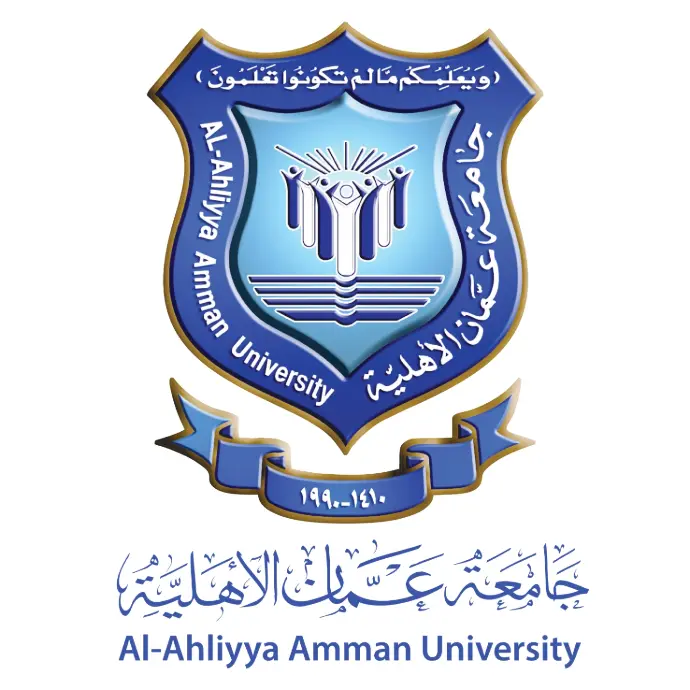
Registration Fees
The OCMT'2025 Registration Fees quoted below include:
- Entrance to all online sessions of the Conference
- An electronic copy of the Conference proceedings
- Associated Conference materials.
All prices are in USD $ (American Dollar).
Due to the continuing uncertainty around traveling to conferences, OCMT'2025 will be online (Virtual) and Physically (in-person).
| Category |
Virtual Attendee with Publication
|
Virtual Attendance (Presentation Only) without Publication | Physically Attend with Publication | Physically Attend without Publication |
|---|---|---|---|---|
| Students | 300$ | 100$ |
450$ |
100$ |
| Academic | 350$ | 140$ |
500$ |
200$ |
Notes:
– The fee above includes the publication and presentation fee.
– The paid fee is not refundable.
– All payments are processed securely through the ConfManage system. A standard 5% transaction fee applies to cover payment processing charges from PayPal and bank transfer providers. This fee will be automatically reflected in the invoice.
Payment Deadlines
Participants’ payments must reach us no later than April 7, 2025
Contact Information
Dr. Randolf Von Salindo, Assistant Dean for Academic Affairs & Scientific ResearchHalban, Sultanate of Oman,
Tel: (+968) 24051010
Conference email: ocmt2025@ocmt.edu.om
OCMT’2025
Themes
"Designing Tomorrow: The Role of Innovation in Modern Infrastructure"
- This theme can focus on how advanced design principles and smart technologies are reshaping industries such as urban development, architecture, and engineering. Sessions can explore sustainable design, smart cities, and the future of construction.
"Revolutionizing Finance: Digital Technologies and Financial Inclusion"
- This theme would cover digital finance innovations, including blockchain, AI in financial services, mobile banking, and how technology can increase financial inclusion in emerging markets.
"The Future of Computing: Integrating AI, Quantum, and Cloud Technologies"
- Sessions under this theme could delve into the latest advancements in AI, quantum computing, cloud infrastructure, and how they intersect to solve modern challenges in industries like healthcare, logistics, and education.
Tracks
Advanced Design and Smart Infrastructure
- Focus Areas:
- Smart city development and sustainable urban planning.
- IoT and sensor-based infrastructure systems.
- Innovative architectural design for energy efficiency.
- Human-centered design for public spaces.
- Automation in construction and building technologies.
Digital Finance and Blockchain Innovations
- Focus Areas:
- Blockchain technology and its applications in banking, supply chain, and asset management.
- FinTech developments in mobile banking and digital wallets.
- AI and machine learning for fraud detection and risk management.
- Cryptocurrency trends and regulations.
- Financial inclusion through digital platforms in underserved regions.
Artificial Intelligence and Machine Learning in Industry
- Focus Areas:
- AI-driven automation in manufacturing and logistics.
- Machine learning applications in healthcare, finance, and education.
- Ethical AI and bias reduction in AI systems.
- Natural language processing and its impact on customer service.
- AI-powered predictive analytics for business decisions.
Cybersecurity and Data Privacy
- Focus Areas:
- Cybersecurity challenges in digital finance.
- Data encryption and secure transaction mechanisms.
- Privacy-preserving AI and machine learning models.
- Regulation and compliance in a data-driven economy.
- Emerging threats and mitigation
strategies for cloud and IoT
systems.
5- Smart Business Administration and Strategic Solutions
- Focus Areas:
- Smart tools for organizational leadership and decision-making.
- Digital transformation for small and medium enterprises (SMEs).
- Enhancing productivity through business process automation.
- Data-driven strategies for performance improvement and growth.
- Smart HR solutions for workforce management
6- E-Marketing Strategies for the Digital Era
- Focus Areas:
- Smart social media campaigns for effective branding.
- Data analytics for personalized customer engagement.
- Search Engine Optimization (SEO) and Search Engine Marketing (SEM).
- Consumer behavior analysis in digital environments.
- AI tools for smart digital marketing strategies.
7- Management Information Systems (MIS) for Business Innovation
- Focus Areas:
- Smart MIS tools for decision-making and workflow optimization.
- ERP systems to streamline business operations.
- Enhancing organizational performance with data analytics.
- Supply chain and inventory management using MIS.
- Digital solutions for project and resource management
8- Sustainability and Green Innovation
- Focus Areas:
- Renewable energy solutions for infrastructure and design.
- Sustainable urban development and eco-friendly construction.
- Circular economy practices in business and industry.
- Reducing carbon footprints through smart design and operations.
- Waste management and water conservation strategies.
Conference President
H.E Dr. Nasser Al-Mawali
Chair of Board of Trustees, OCMT
Conference Chair
Dr. Hazem Migdady
Dean, OCMT
Conference Co-Chair
Dr. Randolf Von Salindo
Assistant Dean for Academic Affairs & Scientific Research
Organising Committee
Nafla Al Falahi- Assistant Dean for Administrative and Financial Affairs, OCMT
Dr. Mark Doblas- Head, Administrative and Financial Sciences Department, OCMT
Dr. Mohammad Mastan- Head, Computer Science -Management Information Systems Department, OCMT
Dr. Mohammad Al Nejem-Head, Department of Design, OCMT
Mr. Abdullah Belhadia- Head, Quality Assurance Department, OCMT
Dr. Elnaz Rashadi Gajan- Head, General Foundation Program
Dr. Vishal Dattana- Director, Digital Transformation Project, OCMT
Dr. Supriya Pulparambil- Head, Scientific Research and Innovation Unit, OCMT
Dr. Abdul Muttaleb M.A. Al Sart, Ahlia University, Bahrain
Prof. Mohammad Nurunnabi, Prince Sultan University, Saudi Arabia
Dr. Frank,lin Nakpodia, Durham University Business School, UK
Dr. Shivoham Singh, Symbiosis Institute of Business Management, Hyderabad, India
Dr. L.R Manjunatha, City and Guilds of London Institute, UK
Prof. Dr. Ayesh AlRhoob, Dean, Faculty of Science & Information Technology, Al-Zaytoonah University of Jordan
Dr. Mohammed Alfraheed, Dean, Faculty of Information Technology, Tafila Technical University, Jordan
Dr. Vinodh Natarajan, University of Technology Bahrain, Bahrain
Dr. Carl Mark Miniano, De La Salle University, Philippines
Dr. Layla Faisal Alhalwachi, Bahrain Polytechnic, Bahrain
Dr. Cecilia Lagaras, Mindanao State University – IIT, Philippines
Prof. Dr Khalid Sultan, National University of Modern Languages, Islamabad, Pakistan
Dr. Izzat Alsmadi, Texas A&M, San Antonio, USA
Dr. Mohammad Otair, Dean, Faculty of Information Technology, Middle East University, Jordan
Dr. G. Jai Arul Jose, BMS Institute of Technology and Management, India
Dr. Sedat Yuksel, Afyon Kocatepe University, Turkey
Dr. Tarek Gasmi, Institut Supérieur d'Informatique et des Techniques de Communication, Tunisia
Dr. Hassan Y. Tarawneh, Al-Ahliyya Amman University, Jordan
Dr. Tahir Alyas, Lahore Garrison University, Lahore, Pakistan
Dr. Syed M. Adnan Shah, University of Engineering and Technology, Taxila, Pakistan
Dr. Masita Jalil, University Malaysia Terengganu, Malaysia
Dr. Aziz Bin Deraman, University Malaysia Terengganu, Malaysia
Dr. Sanaa Ahmed Kadhim, University of Information Technology and Communications (UoITC), Iraq
Dr. Zuhair Hussein, University of Mustansiriyah, Iraq
Dr. Akram zayan, Alexanderia University, Egypt
Dr. Hamzah Salman Almamori, University of Babylon-Iraq
Dr. Ashraf Mohamed Soliman Mahrous, Kingdom University, Bahrain
Dr. Abbas Abdo Farea Al-Warafi, Kingdom University, Bahrain
Dr. Nancy Alajarmeh, Tafila Technical University, Jordan
Dr. Malek El Weriemmi, University of Tunis, Tunisia
Dr. Mahmoud Eqab, Yarmouk University, Jordan
Prof. Dr. Jamal Muhammad Youssef, Helwan University, Egypt
Dr. Jamal Zaraqo, University of Petra, Jordan
Dr. Yaman Y. Sokienah, Yarmouk University, Jordan
Dr. Saed Adnan Mustafa, The American University of Kurdistan, Kurdistan Region of Iraq
DR. OMAR ALMOUSA - Jordan University of Science and Technology, Jordan
PROF. DR. YAHYA TASHTOUSH- Jordan University of Science and Technology, Jordan
Online Participation
The presentations will be made online via MS Teams Platform & in-person (Face-to-Face). Online presentations will be held in a virtual environment.
- Presentations will be made in real-time video conferencing.
- A separate virtual session will be defined for each session.
- Virtual sessions will be open to all participants.
- Presentations will be limited to conference guidelines.
Schedule
The detailed schedule will be provided after the submission deadline .
Post-Conference
Post-Conference Highlights
OCMT’2025 International Conference: A Post-Event Summary
Under the patronage of H.E. Dr. Nasser bin Rashid Al-Maawali, Undersecretary of the Ministry of Economy, the International Conference on Smart Solutions for Modern Design, Business, and Computer Innovations (OCMT’2025) was successfully held on 16–17 April 2025 at the Oman College of Management and Technology (OCMT) campus, drawing together global academic, industry, and policy leaders under one platform of innovation and collaboration.
Organized with the strategic support of partners including Al-Ahliyya Amman University (Jordan), Al Zahra College for Women (Oman), EuroMid Academy, and Yarmouk University (Jordan), OCMT’2025 served as a landmark academic event aligned with Oman Vision 2040 and focused on the conference’s three central themes: Digital Finance and Financial Inclusion, Design Innovation in Infrastructure, and Future Technologies in AI, Cloud, and Quantum Computing.
Key Highlights
- Participation: Over 250 registered attendees representing 35 Higher Education Institutions across 15 countries (including Oman, India, Philippines, USA, UAE, and Jordan).
- Research Output: 105 paper submissions received; 87 papers accepted; 73 papers presented and submitted to Springer for publication in a Scopus-indexed book series.
- Presentation Format: Delivered in hybrid format—34 papers on-site and 39 virtually across 21 technical sessions.
- Best Papers: Top papers from each day were recognized, with contributions from researchers in Bahrain, India, Oman, Lebanon, and the Philippines.
Keynote Addresses
- Dr. Maha Shehadeh (Al-Ahliyya Amman
University, Jordan)
“Strategic Digital Transformation in the Context of National Visions.” - Dr. Salim Al Shuaili (Ministry of Transport,
Communications, and IT, Oman)
“National Program of AI and Advanced Digital Technology.”
Strategic Recommendations
Reflecting input from presentations and discussions, OCMT’2025 issued multi-tiered recommendations:
- National Level (Oman):
- Establish a National Academic-Industry Council
- Launch an AI Innovation Acceleration Lab
- Embed culture-responsive design thinking in public projects
- Expand technical and vocational pathways in digital and green sectors
- Regional (GCC):
- Create a GCC Research Sharing Network
- Coordinate AI, blockchain & cybersecurity bootcamps across the Gulf
- International:
- Institutionalize Global Research Impact Plans tied to the UN SDGs
Media and Community Engagement
- Interviews & Coverage: Pre-conference radio and live TV interviews with Dr. Hazem Migdady, plus extensive social media outreach on LinkedIn, Instagram, and X.
- Volunteer Support: Over 30 student volunteers and staff ensured smooth logistics, registration, and technical support—showcasing OCMT’s commitment to experiential learning.
Looking Forward: OCMT’2026
Building on this year’s success, OCMT will expand OCMT’2026 with new thematic tracks on digital equity, climate-resilient solutions, and inclusive innovation. Plans include introducing poster sessions and interactive workshops to boost early-career researcher participation.
Strategic Recommendations
The OCMT 2025 conference provided a valuable platform for researchers, academics, and professionals to engage in meaningful discussions across three major themes:
• Participants explored how advanced design principles and smart technologies are transforming urban development, architecture, and engineering.
• Attendees examined how technologies can enhance financial inclusion, especially in emerging markets.
• Sessions highlighted the convergence of AI, cloud infrastructure, blockchain, robotics and their impact on solving complex challenges across sectors like healthcare, logistics, and education.
In alignment with Oman Vision 2040 and the national strategies championed by the Ministry of Higher Education, Research and Innovation (MOHERI)—as well as in coordination with the Ministry of Transport, IT and Communication—the following recommendations have been developed from the themes, presentations, and discussions of the conference. These proposals emphasize applied innovation, strategic collaboration, and responsiveness to societal and industry needs at the local, regional, and international levels.
A. LOCAL PRIORITIES (Oman)
1. Form a National Multi-Sector Academic-Industry Advisory Council
Establish a national council under the leadership of MOHERI, composed of senior representatives from Oman’s universities, private sector associations (including the Oman Chamber of Commerce and major industry clusters), and relevant government agencies such as the Ministry of Labor and the Ministry of Transport, IT and Communication. The council’s mandate will include regularly reviewing academic curricula, facilitating co-developed research projects, aligning educational programs with labor market forecasts, and expanding experiential learning pathways such as apprenticeships, industry placements, and real-world capstone projects. The council will also oversee national skills mapping initiatives, provide policy advice to align academic output with Vision 2040’s strategic sectors, and recommend agile curriculum updates to reflect technological shifts and economic needs in the Sultanate.
2. Establish a National AI & Innovation Acceleration Lab
Establish a national research and development facility housed in any academic institution with enough capabilities and resources that will serve as a flagship hub for applied innovation in the fields of artificial intelligence, financial technology, smart agriculture, cybersecurity, and digital government solutions. Unlike the existing research groups in universities, which focus primarily on theoretical and academic research, this new lab will emphasize real-world application, prototyping, and implementation. It will not operate as a conventional business incubator, but as a mission-driven, research-intensive experimentation platform.
Equipped with advanced infrastructure, the lab will promote collaborative engagement among students, faculty, government agencies, and the private sector. Strategic alliances will be formed with Oman's digital economy stakeholders and global tech leaders to provide access to real datasets, mentoring, and commercialization pipelines. The lab will support development of deployable solutions focused on solving priority challenges outlined in Oman Vision 2040.
3. Institutionalize Culture-Responsive AI & Design Thinking in Public Projects
Promote ethical and inclusive innovation through collaborative public and private sector projects that prioritize privacy, accessibility, and design principles rooted in the wisdom of Omani culture and tradition. This initiative should focus on embedding culturally grounded innovation into the development of technologies and services, particularly within Oman’s high-impact yet underdeveloped sectors such as agriculture, fisheries, and mining. This initiative aligns with Oman Vision 2040’s commitment to preserving national identity while fostering a forward-looking society built on innovation and sustainability.
These projects should be co-designed with local stakeholders to ensure their authenticity, relevance, and acceptance. Guidelines, templates, and policy toolkits should be developed to institutionalize culture-sensitive design thinking across public digital infrastructure, services, and development projects—reinforcing Oman Vision 2040’s goals of inclusive, sustainable, and culturally rooted national progress.
4. Initiate a “Smart Oman Communities” Student Research Fund
Support applied student and faculty-led research initiatives that directly respond to local development challenges in Omani towns and governorates. The fund will provide seed grants for pilot projects in areas such as smart traffic management systems in urban centers, solar-powered irrigation and microgrid solutions in rural farming communities, and digital health tools for remote healthcare access. Project teams will collaborate with wilayat municipalities, SMEs and other stakeholders to ensure that the solutions are contextually appropriate and community-validated. Results from these pilots will be documented and evaluated for scale-up potential through partnerships with national ministries and development agencies, thereby reinforcing Oman’s commitment to grassroots innovation as envisioned in Oman Vision 2040.
5. Strengthen Technical and Vocational Education Pathways in Digital and Green Sectors
Expand curriculum offerings and certification programs in areas aligned with Oman’s national development priorities, including digital transformation, renewable energy systems, and smart city infrastructure. This expansion should be guided by labor market intelligence and developed in partnership with industry leaders to ensure relevance and employability. Special emphasis should be placed on practical, work-integrated learning and modular credentials that can be accessed by school leavers, mid-career workers, and job seekers. Programs should also address emerging technologies such as IoT, AI for automation, solar and wind energy operations, and sustainable urban planning—equipping Omani youth with the technical skills and adaptive competencies required to thrive in the rapidly evolving economy envisioned under Oman Vision 2040.
B. REGIONAL PRIORITIES (GCC Focus)
6. Build a GCC Research Sharing Network
Create an integrated research-sharing platform among strategic partner universities and colleges across the GCC region. This platform should be jointly operated and co-financed by the respective higher education ministries of the GCC states, with governance support from a rotating regional academic council leadership. It will host digital databanks/repositories of conference outputs, promote cross-border research projects, and facilitate policy-relevant academic dialogue to support innovation and sustainable development goals.
7. Develop Regional Capacity-Building Bootcamps on AI, Blockchain & Cybersecurity
Coordinate a series of short, intensive, and hands-on training programs focused on emerging technologies such as artificial intelligence, blockchain applications, and cybersecurity protocols. These bootcamps should be hosted in collaboration with regional universities, technology parks, and professional associations, and be held across various GCC cities to ensure geographical inclusivity. Each bootcamp will include industry-led modules, practical labs, and certification tracks co-endorsed by national education and labor ministries. They should also prioritize the inclusion of youth, women, and mid-career professionals, offering them access to regional mentorship networks and pathways to internships or employment opportunities in the digital sector.
8. Create Regional Task Forces for Community-Based Tech Deployment Pilots
Facilitate the formation of interdisciplinary task forces comprising university researchers, municipal governments, industry professionals, and NGOs from GCC countries. These task forces should be mandated to design, implement, and evaluate targeted pilot projects that address community-level digital challenges, such as improving digital literacy among marginalized populations, enhancing rural internet connectivity, and deploying clean-tech solutions for local waste or water management. Each pilot should be designed with measurable outcomes, community engagement mechanisms, and scalability plans. Task forces will be supported through intergovernmental funding frameworks and guided by a regional steering committee to ensure coherence, replicability, and alignment with broader national innovation strategies across the GCC region.
C. INTERNATIONAL PRIORITIES
9. Institutionalize Post-Conference Global Research Impact Plans
Align future OCMT conference themes with Oman’s United Nations Sustainable Development Goals (SDG) commitments by focusing on areas of national significance and global relevance. Beginning with OCMT 2026, curate thematic tracks that address sustainable development challenges—such as digital equity, renewable energy, food security, and water sustainability—through OCMT’s core strengths in Computer Science, MIS, Business Technologies, and Design Innovation.
This targeted approach will reinforce Oman’s leadership in SDG implementation, elevate the global impact of local research, and position OCMT as a regional driver of innovation for sustainable and inclusive development under Oman Vision 2040.
The International Conference: Smart Solutions for Modern Design, Business and Computer Innovations (OCMT’2025)
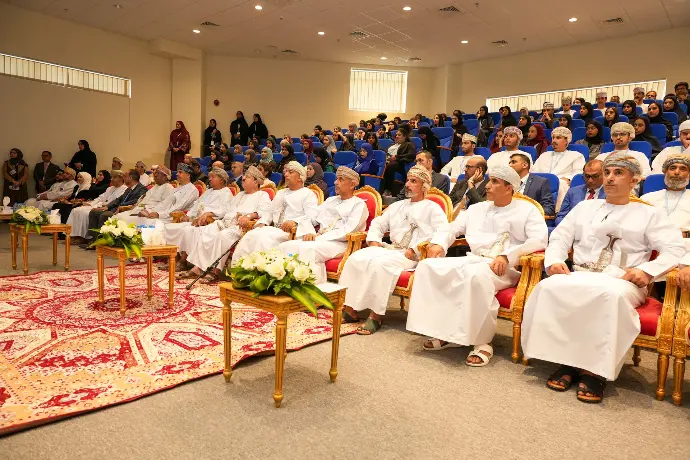
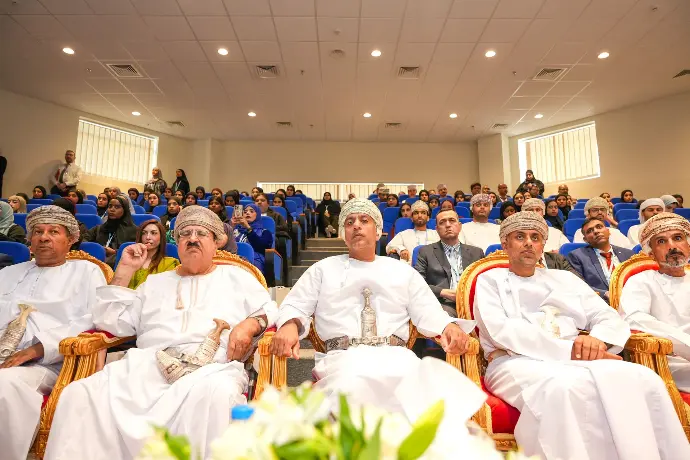
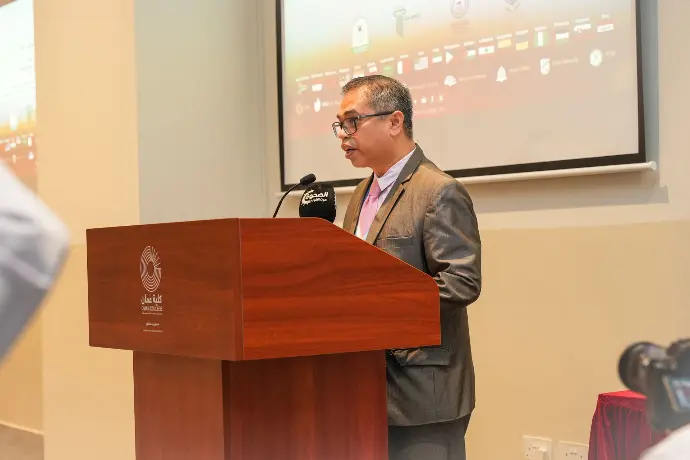
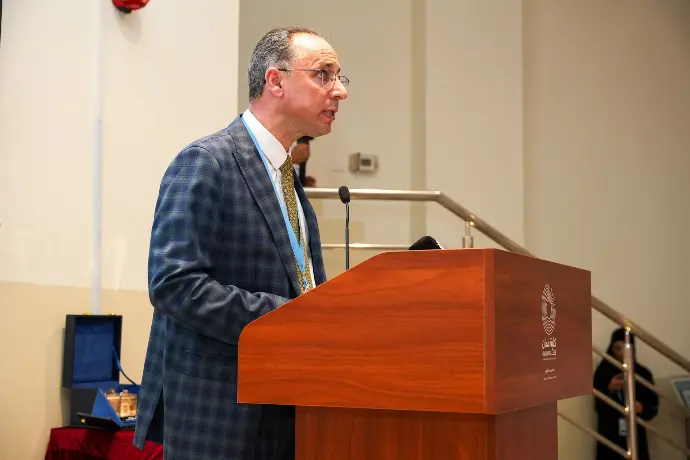
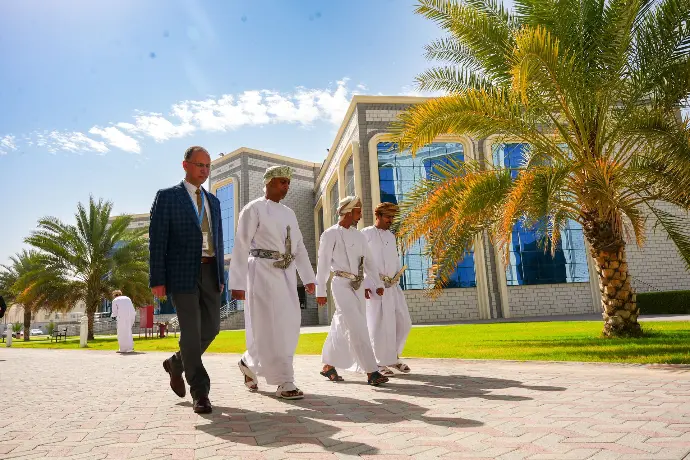
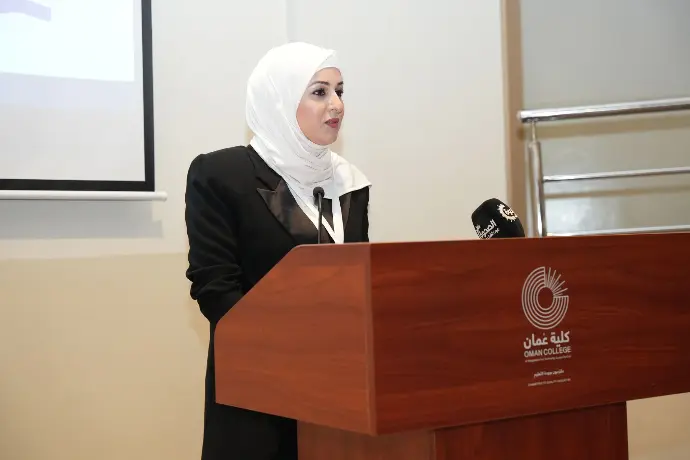
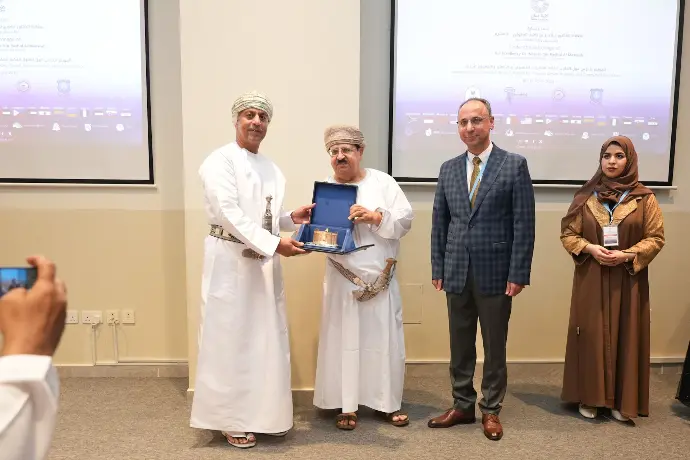
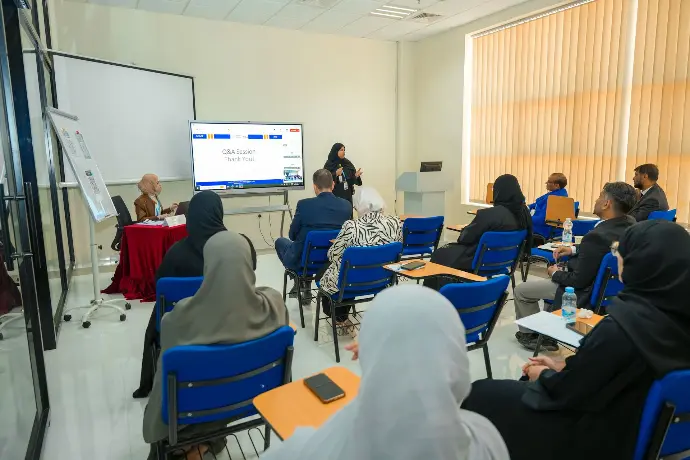
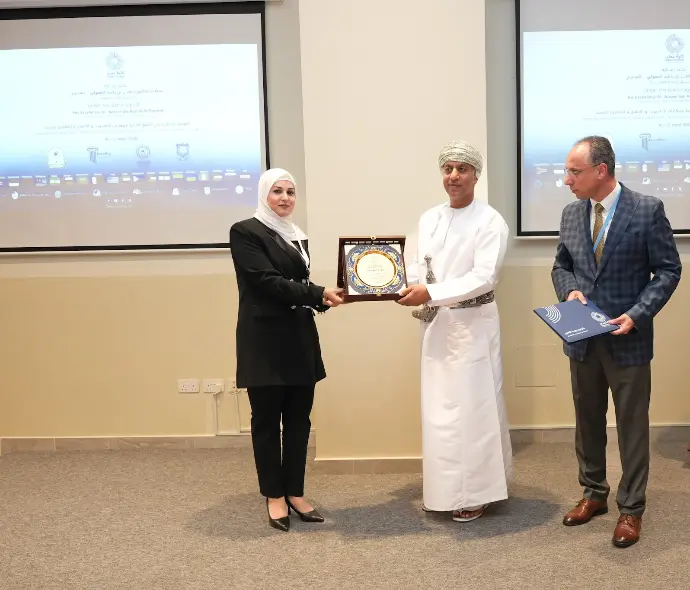
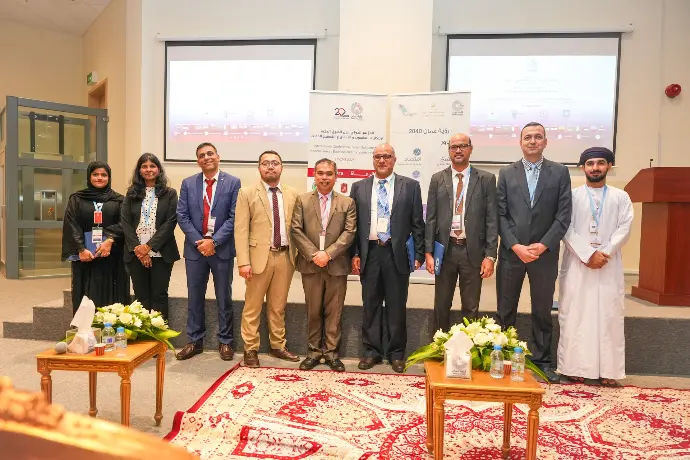
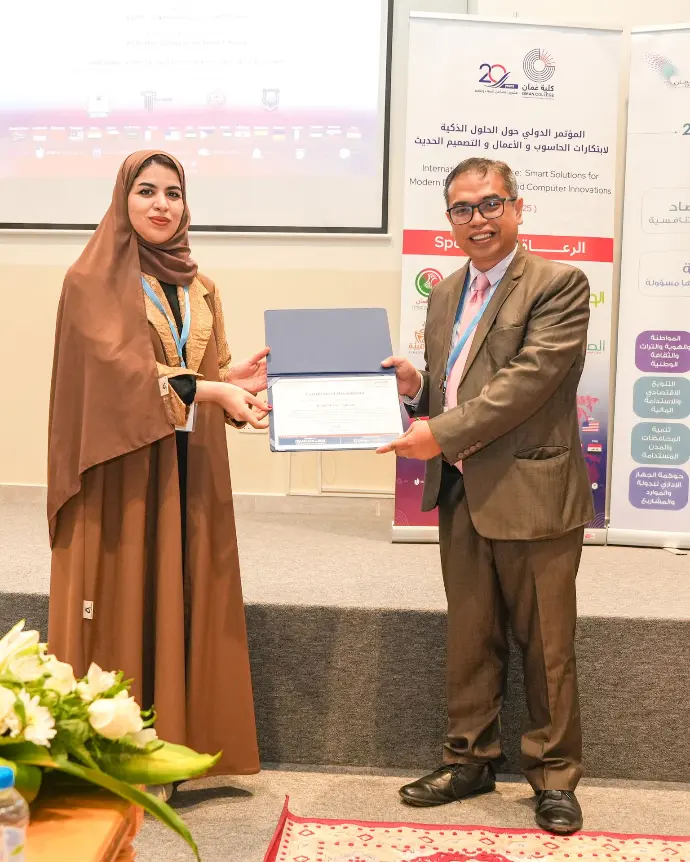
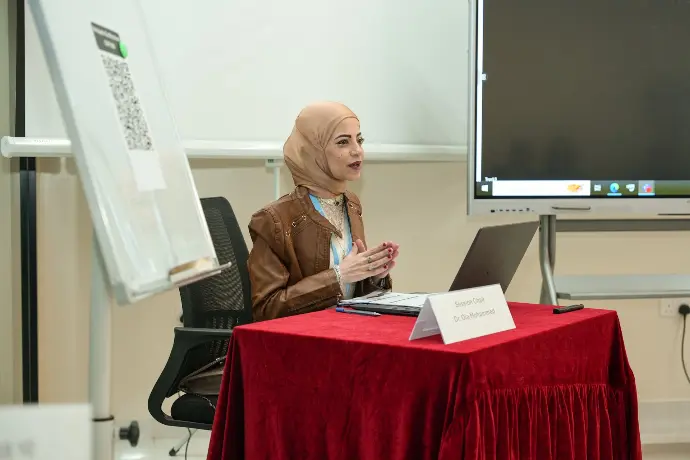
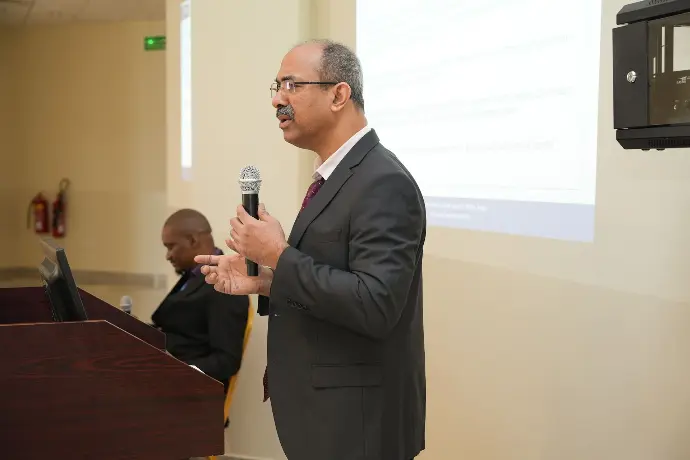 Previous
Next
Previous
Next













Teaser for OCMT’2026


